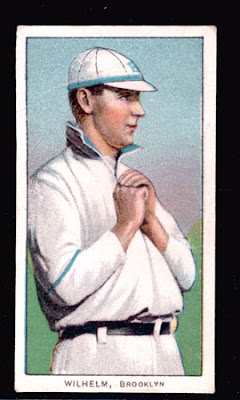 It has been amazingly difficult doing research on this former Brooklyn player. Irvin Key Wilhelm, better know as Kaiser Wilhelm, spent 3 years of his 9 year Major League career with the Brooklyn Superbas. When I did some basic google searches for Kaiser 9 out of 10 results were related to the former German Emperor who started WWI. Even searching his given name yielded undesirable results. Nevertheless, I'll do my best.
It has been amazingly difficult doing research on this former Brooklyn player. Irvin Key Wilhelm, better know as Kaiser Wilhelm, spent 3 years of his 9 year Major League career with the Brooklyn Superbas. When I did some basic google searches for Kaiser 9 out of 10 results were related to the former German Emperor who started WWI. Even searching his given name yielded undesirable results. Nevertheless, I'll do my best.One of the things I wanted to find out was why he was given such a undesirable nickname. After all, most Americans, at the time, despised the the German warmonger, so it must not have been very flattering to Wilhelm. It can't be just as simple as sharing a similar last name, can it? In a newspaper obituary at Deadball Era it indicates that his nickname was "Kize." So, it appears he may have disavowed the name later in life. If you happen to know the true story please pass it along.
Kaiser Wilhelm was a right handed hurler who had a couple of years of pure brilliance. In 1907, while with the Birmingham Barons of the Minor League Southern Association, he established the professional consecutive scoreless innings pitched record at 56 innings. Then in 1908, during his first year in Brooklyn, he won 16 games and lost 22 for a terrible team. His ERA was a tiny 1.87 (good enough for the third best ERA in Brooklyn history) with 6 shutouts and 33 complete games. Unfortunately, the following two years for Brooklyn were not as good. He lost 20 while only winning 6 games from 1909 to 1910, and his ERA ballooned by almost 3 runs. Wilhelm was subsequently sent back down to the minors until 1914 when he jumped ship to join the Baltimore Terrapins of the competing Federal League. As you may know, the Federal League was a competitor to the American and National Leagues, but failed to gain a foothold as it only survived for two seasons.
In 1917 the United States entered WWI and Wilhelm joined the effort by becoming a government inspector. By the end of the war, he was back in Baseball as he assisted "Wild Bill" Donovan when he managed the Phillies. Then, he became the manager himself from 1921 to 1922.


No comments:
Post a Comment